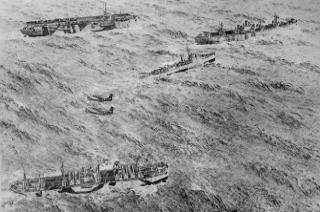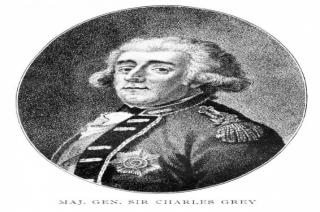Martha’s Vineyard endured a precarious existence in those heady days of the young republic. As the founding fathers debated the philosophical underpinnings of liberal democracy in Philadelphia, entire British and Hessian fleets skulked just over our horizon (as reported by contemporary whalers). The vulnerable and largely defenseless Island was caught in limbo and few natives ventured to offend the Crown. As the war drew on, though, and these specters increasingly emerged in Vineyard harbors to exact their punishing toll, Islanders became patriots.
Revolutionary War
2010
1999
July 30, 1999
For the sheep grazing in pastures above Vineyard Sound, the patches of weathered canvas beating toward Holmes Hole were barely worth a glance away from meals of September grass. Farmers, townspeople and public officials, however, greeted the approach of some four dozen English-flagged vessels with a bit more alarm.
1976
July 2, 1976
Anne Morrow Lindbergh wrote, “It doesn’t matter that it can’t last, that we don’t find it more often. To know that there has been such perfection - it is worth living for. It exists. It has been - it is. One can contemplate it and feel a complete peace.”
We reach into the past to uncover characters, words or deeds that may reaffirm our belief in the principles of our nation or the lifestyle of our Island. We try to create an idyllic past - the ‘perfection’ of which Mrs. Lindbergh wrote - so that we may strive toward an idyllic future.
1942
January 16, 1942
The work of dredging now going on at Tashmoo Creek focuses attention upon one of the historical landmarks of the Island and one of which very little is remembered or preserved. Indians called this locality Chappaquansett, and old records refer to the creek as Chappaquansett Creek, rather than Tashmoo. It is evident that the Indians frequented this place in the olden days, as sizable middens have been located nearby and others are presumably buried beneath the shifting sands or have been washed out to sea.
1848
October 20, 1848
An account, in value, of sundry articles taken from the following named persons, by the British Forces in Edgartown, between the tenth and fifteenth day of September, 1778 - said articles consisting of grain, potatoes, cabbages, clothing, swine, leather, lumber, naval stores, salt, craft, provisions, herring, house goods, ‘sarce.’





